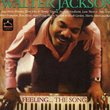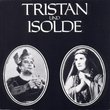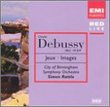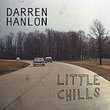| All Artists: Giuseppe Verdi, John Alldis Choir & Royal Philharmonic Orchestra, Aldo Ceccato, Beverly Sills, Nicolai Gedda, Rolando Panerai, Robert Lloyd, Mirella Fiorentini, Mario Carlin, William Elvin, Keith Erwen Title: Verdi: La Traviata / Sills, Gedda, Panerai; Ceccato Members Wishing: 1 Total Copies: 0 Label: EMI Classics Release Date: 10/25/1990 Genre: Classical Style: Opera & Classical Vocal Number of Discs: 2 SwapaCD Credits: 2 UPCs: 077776982724, 077776982755 |
Search - Giuseppe Verdi, John Alldis Choir & Royal Philharmonic Orchestra, Aldo Ceccato :: Verdi: La Traviata / Sills, Gedda, Panerai; Ceccato
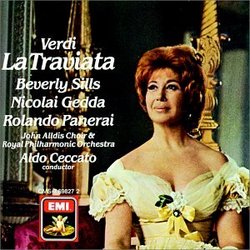 | Giuseppe Verdi, John Alldis Choir & Royal Philharmonic Orchestra, Aldo Ceccato Verdi: La Traviata / Sills, Gedda, Panerai; Ceccato Genre: Classical
|
Larger Image |
CD DetailsSimilar CDs
|
CD ReviewsA Perfect Traviata Rod Tierman | 09/24/2002 (5 out of 5 stars) "There are many fine Traviatas out there (Callas, 2 by Sutherland, Caballe, Cortubas, and the like), but I feel this one is the best of the lot. Beverly Sills is extremely fresh voiced here and delivers her arias with freshness and aplomb. Her "Sempre Libera " is simply breathtaking. Her colleagues here are also unsurpassed. Nicolai Gedda is magnigicent here,offering just the right amout of lyricism and passion to the role of Alfredo (even demonstrating an incredible High C at the end of his caballetta "Oh mio rimorso! Oh, infamia!"). Gedda is my favorite of any of the recorded Alfredos. Rolando Panerai is probably the finest Germont the elder I have ever heard. His "Di Provenza Il Mar, Il Suol" will literally tear at your heartstrings and this reviewer has never heard a finer rendition since the American Baritone Lawrence Tibbett. Aldo Ceccato is the conductor here and does a very fine job indeed. If you want to hear La Traviata the way it should be performed, treat yourself to this recording." La Traviata Heaven: The Greatest Recording Rudy Avila | Lennox, Ca United States | 05/01/2004 (5 out of 5 stars) "Verdi's La Traviata is to many the definition of romantic opera. It's about tragic love, it's Verdi's most intimate and most personal opera. Verdi at the time was living unmarried with his lover and soon to be wife Giuseppina Strepponi, an opera singer. The music attests to the heartache and the passion that composes the bulk of the opera. On this recording, Beverly Sills sings the role of Violetta Valery and tenor Nicolai Gedda is Alfredo. Violetta and Alfredo are opera's most memorable lovers. Gedda and Sills both possess a charming, beautiful voice perfectly suited for the gentle lovers. This recording is from the 70's. Beverly Sills had sung Violetta Valery more than 50 times and it was her first starring role. She knew the part like the palm of her hand. Her beautiful humanity in her voice alone presents us with the real Violetta- the noble courtesan/prostitute of Paris nightlife who sacrifices her own happiness for the sake of Alfredo's father. Beverly Sills has a "French voice" - her greatest vocal gift was to sing lengthy sustained melody and to dazzle the human ear with coloratura agility and high notes. But her Italian is nothing to laugh at. Her Italian is superb, especially in the bel canto category. As Violetta, she is the best. Her Act 1 highlights include the Brindisi (I have never heard any soprano, including Callas and Sutherland) sing it as "right" as Beverly Sills does it, and her solo showcase "A Fors E Lui" and the coloratura fireworks of "Sempre Libera". Beverly Sills is simply amazing, especially when she tops off the aria with that high note. The lyrical melancholy of the duet with baritone Roland Panerai, perfectly paired also, is excellent to hear. The finale is going to move you to tears from the "Addio Del Passato" to her dying exclamation "O Gioa!". This is the greatest ever made and I don't care that most will always flock to the Sutherland and Callas recordings. To my mind, it's not necessary to have a bigger voice or a diva status to be Violetta. Beverly Sills may not have been a diva, but she was the greatest actress of the opera in a way where most sopranos fail- connection with the audience and a spiritual relationship with the music." She's no Callas--and I mean that as a compliment. Judy Gates | Rumford. RI | 02/17/2000 (5 out of 5 stars) "I love Callas, but sometimes I just don't feel like being a masochist. In roles that fall within her more limited range, Beverly Sills is every bit as penetrating an actress as Callas, with a security in the top notes that is among the most dazzling on record. Sills' Violetta lives and dies with infinite dignity, nobility, and yearning. Her death is credible and tragic, with the voice used to SUGGEST disease rather than falling victim to it. I hope, as the Callas re-issue frenzy peaks, that Sills will soon be represented more completely on disc.As Alfredo, Gedda is also immensely appealing, but with a sweetness of tone that may be just a little too generous for the character. It was perfect for his glorious recording of Manon, also with Sills. Panerai's voice is impressive in tone, but pretty inflexible in characterization. It grew on me, however, as a foil to Sills' Violetta. This is a wonderful recording and a great performance."
|

 Track Listings (24) - Disc #1
Track Listings (24) - Disc #1
